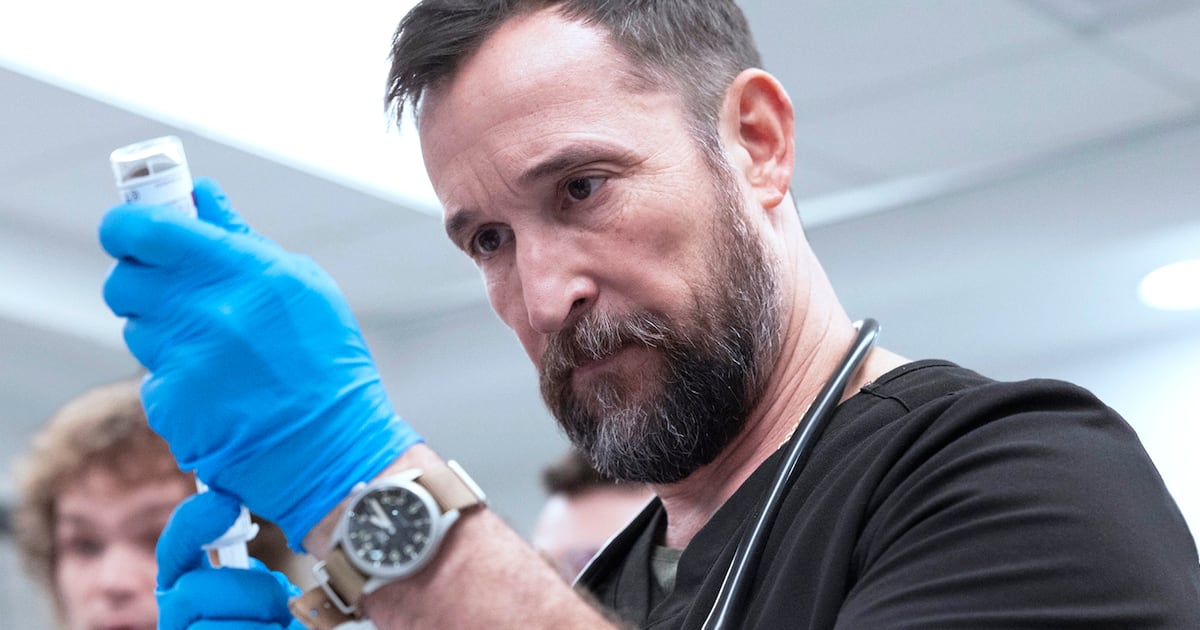For such a successful video game franchise (whose recent PlayStation/Xbox installment, 2021’s Village, was a blast), it’s been amazingly difficult to concoct a faithful screen adaptation of Resident Evil.
Whereas Milla Jovovich and Paul W.S. Anderson’s six-film series had its fair share of pulpy highlights, it was often related to its source material in name only, and both Netflix’s four-part animated affair Resident Evil: Infinite Darkness and last year’s theatrical reboot Resident Evil: Welcome to Raccoon City failed to do the zombie-killing saga justice. Unwilling to quit while its behind, however, Capcom once again tries to breathe live-action life into its popular survival-horror property with the unimaginatively titled Resident Evil, a new Netflix show (July 14) set after the canonical events of the original games. Unfortunately, their efforts go for naught—save for a typically sturdy Lance Reddick turn, it’s the sort of half-baked thriller most fans will likely abandon mid-adventure.
Die-hards will at least appreciate the numerous game references strewn throughout Andrew Dabb’s Resident Evil, some of them more esoteric than others. Yet they’re not enough to compensate for a story that aims to head in a novel (and quasi-faithful) direction, only to stumble about in search of an exciting set piece, beguiling mystery or scary moment. Frustratingly split between two time frames for reasons that never quite make sense—since this structure exacerbates the helter-skelter tone without enhancing suspense or intrigue—the action opens in gone-to-seed 2036 London, with Jade (Ella Balinska) using rabbits to conduct in-the-field tests on the city’s countless zombies, which are referred to as Zeroes for reasons too lame to explicate. It’s a post-apocalyptic urban wasteland populated almost exclusively by the undead and giant mutant monsters such as the titanic caterpillar that nearly takes Jade’s life, and it—and this entire scenario—feels about as generic as they come, a dull rehash of 28 Days Later meets The Last of Us meets The Walking Dead meets All of Us Are Dead meets [insert any zombie fiction from the past twenty years].
Jade is on a research mission to see if the planet’s flesh-eaters are evolving, and as she jumps from one random locale to another—including a scavenger marketplace and, later, Calais, France—she’s pursued by agents of the Umbrella Corporation, Resident Evil’s signature evil conglomerate responsible for the T-virus, the common cause of the franchise’s zombie outbreaks. A gritty warrior as well as a mom who misses her daughter Bea, with whom she periodically video-chats, Jade is a one-note genre archetype. Nonetheless, the show strives to flesh her out by also concentrating on her 14-year-old self (Tamara Smart) and her sister Billie (Siena Agudong) in 2022. Three months before “The End,” teenage Jade and Billie—who are twins by different surrogate mothers—move into South Africa’s New Raccoon City, a planned community created by the Umbrella Corporation, which also employs their genius-scientist father, Albert Wesker (Reddick). A modernist techno-enclave where everything is white and chrome, New Raccoon City rubs combative Jade the wrong way, even as former angry delinquent Billie attempts to stay on the straight-and-narrow.
Resident Evil aficionados know that Wesker is historically the franchise’s Big Bad, but at outset, Reddick’s version of the character is positioned as a doting dad whose work at Umbrella has to do with Joy, a potentially revolutionary anti-depressant that his boss Evelyn (Paola Núñez) plans to market around the globe to the tune of trillion-dollar profits. Wesker is less sanguine about its prospects, given that it’s apparently led to a prior catastrophe in Tijuana that a local reporter wants to expose, as well as the calamity that befell the original Raccoon City—a detail that casts the original games’ narrative as this one’s backstory. His apprehensions are well placed, since things begin falling apart almost as soon as he and his brood get settled in New Raccoon City, courtesy of Billie’s decision to break into her dad’s lab to free its bunnies (because she’s a vegan) and, for her trouble, suffers a nasty bite from a T-virus-plagued dog.
There are conspiracies afoot in Resident Evil, most of which have been seen in dozens of similar ventures, and multiple shots from inhuman creatures’ POVs and soundtrack songs with painfully on-the-nose lyrics can’t freshen them up. For a show about zombies, the walking dead are a peripheral plot device for the majority of these proceedings, taking a backseat to sisterly and parent-child conflicts, nefarious corporate machinations, and other dull end-of-the-world tropes. Considering the infrequency of its gore, the rare instances of extreme violence are out of place and off, while Resident Evil’s Lickers receive approximately three darkness-enshrouded minutes of screen time. For extensive stretches of the season’s eight hour-long episodes, the focus is on everything but horror, which might be more bearable if its tale weren’t so formulaic and its bombshells so pedestrian.
Resident Evil’s few inspired touches are buried beneath mountains of tedious two-dimensional character drama that never stimulates the imagination or gets the heart racing. Of the (largely forgettable) cast, only Reddick emerges unscathed, using his imposing baritone and equally formidable physicality to make Wesker an alluring and captivating enigma. To that end, the series picks up toward the conclusion of its maiden run, if only because Reddick gets substantially more to do. Still, he can’t change the fact that this venture seems to have been carelessly stitched together on the fly, with one thing after another happening not because any of it makes logical sense but because certain events and decisions are necessary in order to propel everything toward the ultimate destination. Need to find something? There it is! Require a password? We already know it! Searching for an expert hacker? He’s right there! And on and on, until every obstacle and clash comes across as a time-wasting feint.
Alternately steely, passionate, and humorous, Reddick is such a forceful presence that it’s somewhat stunning to find Resident Evil so habitually fixating on second-rate concerns. He deserves far better than this retread—and so too do the games upon which it’s based.





